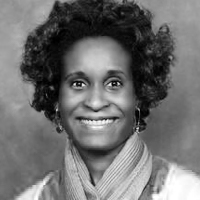This text-based course is a transcript of the webinar, Emergent Literacy Outcomes in Culturally and Linguistically Diverse Preschoolers: Considering Test Scores and Parental Perspectives, presented by Karla Washington, PhD, CCC-SLP, S-LP(C).
Introductory Remarks
Dr. Washington: Thank you very much, Amy, and thank you to everyone for being here today. How many bilingual speech language pathologists do we have in the audience? Three, four, five -- excellent. Welcome to all of you. I'm very pleased that you could be here, and once again, thank you, Amy for this opportunity to disseminate some of the findings of a project that we have just recently completed.
As Amy said, my name is Karla Washington and I'm a speech-language pathologist by trade. I have dual certification both for the United States and for Canada. My primary research area is within the area of child language development and disorders. Just so you have an idea of where we are in the presentation, and where we are going, you can see here that there's a time ordered agenda:
- 2 minutes - Disclosure and greetings
- 10 minutes - Introduction and background
- 38 minutes - Parent-shared reading program: Description and outcomes (qualitative and quantitative)
- 10 minutes - Conclusions and clinical implications
The majority of the time, as you see, will be spent on describing the parent shared reading program and its outcomes.
Learning Outcomes
In terms of the continuing education objectives, these are what I am aiming for the viewers to be able to do at the end of the presentation:
- Describe the importance of contextual considerations on emergent literacy
- Identify parental perspectives on parent shared-reading programs
- Understand qualitative and quantitative outcomes
- Describe major benefits of parent shared-reading programs
- Identify intervention and assessment resources used in the program presented
In particular, I want you to understand qualitative and quantitative outcomes when thinking about research, and how we can understand how well children are doing and how well their parents perceive their children to be doing.
My only disclosure is that this research was funded by the University of Cincinnati through the Vice President for Research Start-up Funds.
Just to give everyone a bit of a background: I have a background in psychology. I was trained in Canada. At the time I was going through my undergraduate training, there were no undergraduate programs in speech pathology, so you received training in a different discipline and then took qualifying courses for the speech pathology program. Following my undergraduate, I enrolled in speech-language pathology and then I completed a PhD following that. I had a great interest in research and asking questions, and so I decided to do a PhD. In that PhD program I worked with children with specific language impairment. I had developed a computer program to help support their grammatical production skills. What we found was that it actually improved their skills better than no intervention.
Following my PhD, I completed a postdoctoral training program in Toronto, Ontario, focusing on pediatric outcome measurement. The tool that I worked on is called the Focus on the Outcomes of Communication under Six. It's now a freely available tool. It was developed by researchers at the Holland Bloorview Research Institute in Toronto and it is meant to examine participation outcomes associated with speech and language intervention. In fact, just this month, one of the papers from my post-doc training has been published in Child Language Teaching and Therapy, looking at predictors and outcomes of participation.

